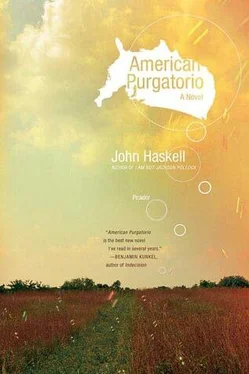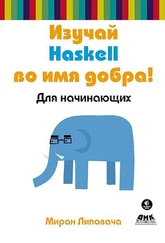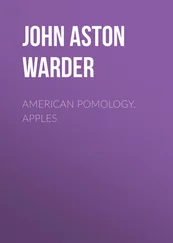John Haskell - American Purgatorio
Здесь есть возможность читать онлайн «John Haskell - American Purgatorio» весь текст электронной книги совершенно бесплатно (целиком полную версию без сокращений). В некоторых случаях можно слушать аудио, скачать через торрент в формате fb2 и присутствует краткое содержание. Год выпуска: 2006, Издательство: Picador, Жанр: Современная проза, на английском языке. Описание произведения, (предисловие) а так же отзывы посетителей доступны на портале библиотеки ЛибКат.
- Название:American Purgatorio
- Автор:
- Издательство:Picador
- Жанр:
- Год:2006
- ISBN:нет данных
- Рейтинг книги:3 / 5. Голосов: 1
-
Избранное:Добавить в избранное
- Отзывы:
-
Ваша оценка:
- 60
- 1
- 2
- 3
- 4
- 5
American Purgatorio: краткое содержание, описание и аннотация
Предлагаем к чтению аннотацию, описание, краткое содержание или предисловие (зависит от того, что написал сам автор книги «American Purgatorio»). Если вы не нашли необходимую информацию о книге — напишите в комментариях, мы постараемся отыскать её.
Los Angeles Times
American Purgatorio — читать онлайн бесплатно полную книгу (весь текст) целиком
Ниже представлен текст книги, разбитый по страницам. Система сохранения места последней прочитанной страницы, позволяет с удобством читать онлайн бесплатно книгу «American Purgatorio», без необходимости каждый раз заново искать на чём Вы остановились. Поставьте закладку, и сможете в любой момент перейти на страницу, на которой закончили чтение.
Интервал:
Закладка:
There were a few papers on her desk, some unpaid bills, a folded map, and several postcard invitations to art-show openings. The map was a well-worn map of the United States and when I unfolded it there was a circle drawn with a felt tip marker around New York City. There was a line from New York to Lexington, Kentucky, which was also circled. As far as I knew she didn’t know anyone in Kentucky. Or Colorado. The thick orange line followed the main highway to Colorado, where the town of Boulder was circled. The line stopped there, except that another circle, on the West Coast, was around San Diego, California. She was from San Diego. She was born there, which made the circle seem more than merely coincidental. It was her map, it had to be, and the cities she’d circled were … I didn’t know what they were, and so I took the map to the kitchen. I’d spread it over the baby photographs on the table, trying to figure out what it meant, when the doorbell rang.
Patty, a neighbor who ran the community garden, was standing on the front stoop with her two black dogs, talking either to the dogs or to the woman standing slightly behind her. When I opened the door (and the dogs began sniffing) she asked if I wanted to participate in the neighborhood garden tour. They were looking for volunteer gardens to put on the list but I said I couldn’t, that I was too busy. But Patty wanted to show her friend, a sturdy, older European woman, the backyard. “He has a beautiful camellia,” she said, and without any invitation from me she stepped inside. She knew the way, and so she led her friend through the house, out the back door, and down the steps into my small plot of garden.
It was early spring and as the two women named and commented on the various species of plants, the dogs played in the bulbs that were just coming up, trampling on and chewing slightly the hyacinths and daffodils and tulips. Thomas Jefferson said something to the effect that tending a garden makes a person grow younger, and maybe I was getting younger in some poetic way, but I wasn’t feeling any younger, and in fact I was feeling tired. I watched the dogs and heard Patty calling the dogs, telling them to stop it and to sit, but I didn’t really mind. I told her, “No problema.”
“What?”
“No problem,” I said, and began asking the two women questions I’d had about tending a garden, and especially how to prune. I was in the mood for pruning, and it’s possible that I heard what I wanted to hear because basically their lesson, as I heard it, was prune with abandon. They told me that plants enjoy being cut, that it’s beneficial to their health, that it spurs their growth, and I probably wanted some control over something, and one way to have control is to cut things off. So that’s what I did.
I waited until Patty had gone and then I kneeled alone in the dappled afternoon shade of the maple tree, examining the various botanical structures that were starting to appear in the garden around me. I looked at my rhododendron, standing against the fence, its buds preparing to flower. Despite the dogs, the daffodils and tulips were breaking through the porous earth. Green tips were sprouting on a pair of blueberry bushes. And because I loved the garden, and because the solace it brought was, in my mind, contrasted to the non-solace in my body, I held the pruning clippers in my hand, not like a surgeon, but I felt like a surgeon, examining a patient for signs of morbidity, looking to cure all forms of disease and death.
This is what I’m calling pride. I believed, along with a million other things, that I could control what the world was doing, and in my garden the world was beginning to grow. And it wasn’t that I didn’t want growth, I did, I wanted it, I wanted my garden to live and prosper, and that’s why I held the clippers. To save something. To be rid of pain and fear, which was my pain and my fear, and although I anthropomorphized the dumb green garden, it was my own dull gnawing that was gnawing me. That was what I wanted to cut. But since I couldn’t cut that, I turned to my plants, first the obviously dead branches, the ones that snapped because the life was gone, and then the partially dead, and then the ones that were alive now but that, at some point later, would be dead. And since everything, at some point later, would be dead, I had my work cut out.
And I’m calling it pride because I believed, not only that the eradication of the bad could happen, but that I could make it happen. That I could fit the world into my particular need, which, at the moment, was a need to cleanse some thing in me, some emotion in me, and yes, I was willing to adjust to the world, but I also wanted the world to adjust to me. I wanted the reality of that moment to leave my body, to float away like a breeze-blown vapor.
That’s when I started cutting. And in this effort to soothe myself and rid myself of what I thought I needed to be rid of, I got carried away. The garden was my world, and to save it I began cutting, and the cutting led to more cutting, and I got lost in the cutting, bud after bud, leaf and twig and blossom falling — not like seeds, because they were dead now — but falling on the ground as I moved from rose to hydrangea to lilac, mindlessly and frantically cutting, so completely involved in the act of cutting, so absorbed in the belief in the beneficence of cutting, that I pruned to death every plant I ever cared about.
I was oddly methodical as I strode from plant to plant, from peony to camellia to forsythia, so numbed by the frenzy that was whirling around inside of me that I didn’t notice what I was doing. Until afterward. That’s when I saw that my carefully nurtured garden had been reduced in a matter of minutes to unliving stalks. That’s when, exhausted and sweating, I sat on a step leading down from the deck and rolled for myself a thin tobacco cigarette. Because I wasn’t a smoker, after about the second puff I got lightheaded, and was just rubbing the butt in the dirt when the telephone rang. I’d been letting the phone ring since Anne had gone, but this time — something about the combination of dizziness and exhaustion and surprise — I forgot to let it keep ringing. I ran into the house to answer, and the next thing I knew I was holding the phone. Mike See, an old hockey buddy who’d apparently called before, was calling now, telling me about this car that was for sale.
4
I didn’t need a car. I already had a car, and I told Mike I had a car, a maroon car, but he kept going on about what a deal this car was and how cheap it was, and as he kept talking I began to realize that in fact, at the moment, I didn’t have a car. I didn’t think I wanted a car but I asked him, as a courtesy, what the price was. He evaded the question of money, and emphasized instead the motivation of the seller, that the car just needed a little attention, and that he and I hadn’t seen each other in a million years. In the course of the conversation I went from uninterested in owning another car to curious about this particular car, and when he said he’d get me a good deal, for friendship’s sake, I told him I might be interested. And so we agreed to meet.
The next day I rode my bicycle to the Red Hook section of Brooklyn, down near the water, to an address I’d written on a piece of envelope. It was a moderately well maintained brick row house and in front of the house a faded red sports car, or quasi-sports car, a Honda or Nissan, was parked on the street. Mike appeared from under the stoop looking as he had years ago — a little heavier and a little slower — jangling the keys. “Let’s go for a cruise,” he said, throwing me the keys. I got in, adjusted the seat and the mirror, and began driving around the warehouse streets, and all the time I was driving Mike was talking, not about the car, but about the girl who was selling the car. She was a nurse, he said, and very friendly. “I’ve told her all about you,” he said. “She wants to meet you,” he said. And I assumed she wanted to meet because she wanted to sell her car, but the way he said it, or the way he kept saying it, made me wonder. We drove around in the cold sunlight and it was pleasant to be driving, and the car itself seemed a fine enough car, nothing exceptional, until Mike mentioned the owner’s breast augmentation.
Читать дальшеИнтервал:
Закладка:
Похожие книги на «American Purgatorio»
Представляем Вашему вниманию похожие книги на «American Purgatorio» списком для выбора. Мы отобрали схожую по названию и смыслу литературу в надежде предоставить читателям больше вариантов отыскать новые, интересные, ещё непрочитанные произведения.
Обсуждение, отзывы о книге «American Purgatorio» и просто собственные мнения читателей. Оставьте ваши комментарии, напишите, что Вы думаете о произведении, его смысле или главных героях. Укажите что конкретно понравилось, а что нет, и почему Вы так считаете.











